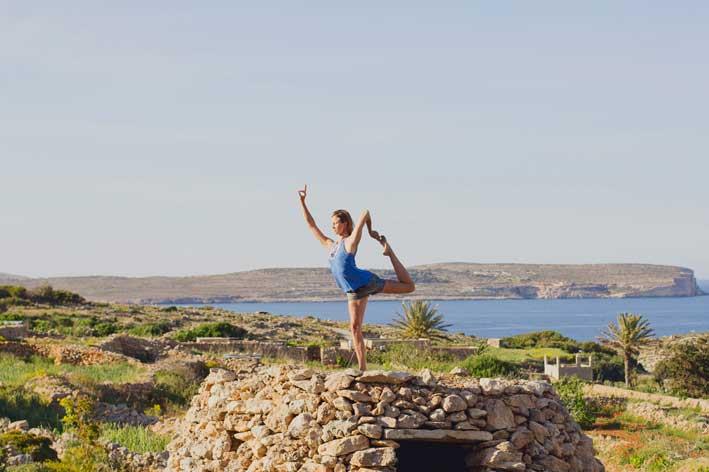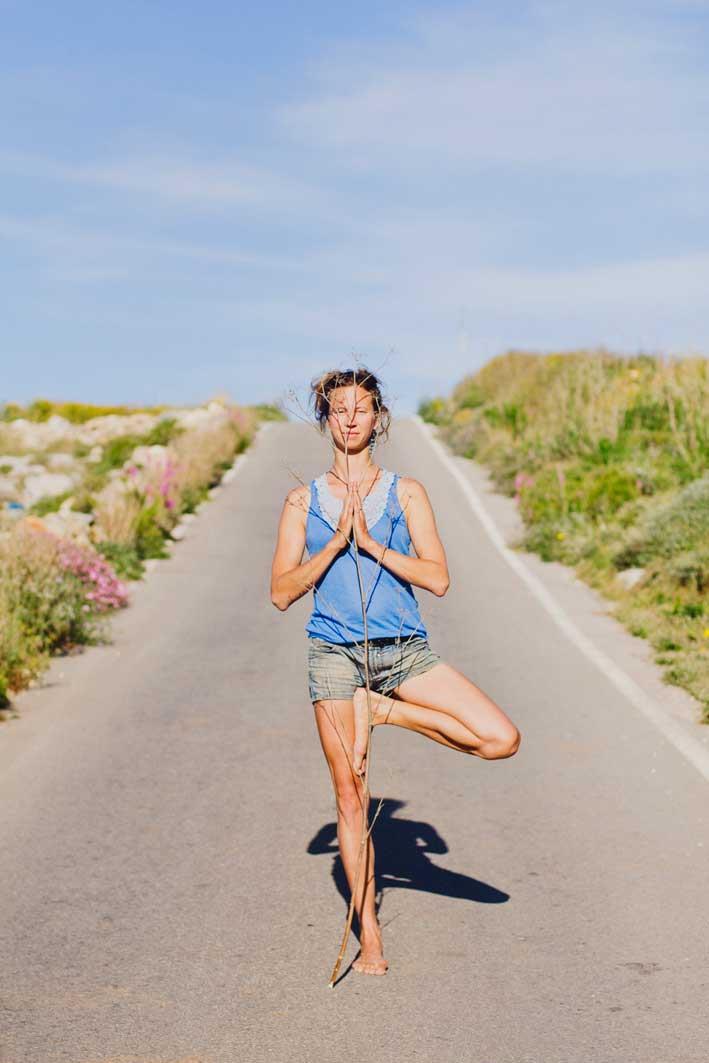I first came in touch with yoga at my university's gym 15 years ago. Its stress-releasing effects, together with a good work-out and some positive twist on my mind, made for love at first sight. I rapidly found a proper yoga school and expanded my practice to include not only the asanas (postures), but also the art of pranayam (breath and energy control) and meditation. A couple of years later a 10-day silent Vipassana meditation retreat gave me a sense of 'home within' that I had never felt before.
Life with Yoga
From then on, I stopped falling into the deep emotional lows that had been part of a rollercoaster pattern throughout my teens and early twenties. A career in environmental and social sustainability; a wedding in Argentina and three children later - I could not imagine my life without yoga. Sometimes I can practice for several hours a day, on other days I only meditate for 15 minutes in the morning but, all the time, it somehow infuses every moment I breathe. Having taught yoga for almost a decade, I have observed the life-changing benefits it can have on people from all walks of life, ages and continents.

Origins
Whilst yoga is not a religion, it certainly is much more than a work-out. It's a philosophy guiding you towards a healthy body, mind and spirit and ultimately freedom, samadhi - eternal bliss - which enlightened beings like the Buddha, Jesus or Mohammed would have found. In fact, the Yoga Sutras by Patanjali, dating back over 2,000 years, barely mention physical postures. Their most famous verse sets the tone for all practices: 'Yoga Citta Vrhti Nirodha' - which is Sanskrit for 'Yoga is the cessation of the fluctuations of the mind'. In other words, rather than getting entangled in one's thoughts, bodily sensations and emotions, through yoga, one learns to observe with equanimity. This paves the way towards santosha, Sanskrit for contentment - one of the 10 basic yogic principles.
Suitable for Everyone
I sometimes hear people say: "I'm not flexible, so yoga isn't for me." Physically, this is a paradox because yoga not only strengthens your body but also increases flexibility. Therefore, less-flexible people are arguably the ones who will benefit the most.
"I can't be still" is another ironic pretext, as yoga trains first the body and then the mind to be at ease with stillness. This is probably one of the biggest challenges for most of us, growing up in a fast-paced world of incessant input and over-stimulation. We have become so good at doing a million things at a time, that we have forgotten the simple act of being in the moment. This is what has caused an epidemic of societal diseases, including migraine, anxiety, stress, insomnia, fatigue, heart-disease, high blood pressure, IBS, drug-abuse, infertility, allergies and depression.
Healing
Rather than yet another pill from the doctor, often what our body needs is simply reconnecting with the breath - consciously relaxing and taking the time to inhale fully and exhale completely. Doing this enables one to create opportunity and space for the body to use its inherent ability to strive for optimal health and well-being on all levels.
An increasing number of scientific studies attest to the myriad benefits of yoga. Asanas, the yoga postures, not only increase the flexibility, strength, vitality and alkalinity in our joints but also work on a deeper level. Gently massaging our glands, they balance our hormones which, in turn, play a key role in being able to deal more effectively with the many challenges we constantly face.
What kind of Yoga is for me?
Running through uncountable Sun Salutes, with neighbour's sweat dripping onto your mat, might not be everyone's cup of tea. Luckily, since Krichnamacharya, the Father of Modern Yoga, started reviving India's ancient art in the mid-1900s, an incessantly growing number of variations have popped up. Here's a summary of the most common ones.
Hatha: This traditionally describes all forms of physical yoga. Nowadays it mostly refers to a more slow-paced practice, focusing on alignment, breathe and relaxation techniques, whilst building strength and flexibility.
Vinyasa Flow: This is a more vigorous style, characterised by continuous movement from one posture to the next through a series of poses called 'Sun Salutations'.
Ashtanga: A fast-paced, intense, physically demanding and flowing set series of poses, always performed in the same order, this was founded by Pattabhi Jois in the 1960s.
Iyengar: Based on the teachings of B.K.S. Iyengar, this style holds poses for several minutes each and is all about correct alignment, often using props such as yoga blankets, blocks and straps - as necessary.
Kundalini: More than other styles, Kundalini works with breath, chanting and cleansing techniques in conjunction with physical movement that is often rigorously repeated many times.
Power: eavily influenced by the intensity of Ashtanga, but allowing for variations in the sequencing of poses at the discretion of the teacher, this modern style tries to cater for the gym enthusiast.
Bikram: This is 26 set poses, performed in a heated room.
Yin: In this slow, simple and meditative style, specific seated poses are held for several minutes each to stretch the body's connective tissue and release deep-rooted physical, mental and emotional tension.
Aerial: These poses are practised in - and with the help of - a silky hammock mounted on two hooks in the ceiling and are a great way to explore inversions.
Acro: This partner yoga combines Thai massage, acrobatics and yoga.

Top 10 Benefits of Yoga
1. Increases physical and mental strength and flexibility
2. Normalises body weight and enables metabolism to function better
3. Strengthens immunity
4. Prevents cartilage and joint breakdown and improves overall bone health
5. Slows down the aging process
6. Improves respiratory efficiency, energy and quality of sleep
7. Balances hormones, together with mental health and emotional stability
8. Helps better concentration, memory and cognitive functions
9. Reduces stress
10. Increases love for yourself and others
Yoga Retreats around the World
1. Barberyn Beach Ayurveda Resort, Sri Lanka: www.barberynresorts.com
2. Adventure, sustainability and Yoga, Patagonia, Chile: www.ecocamp.travel/en
3. Experienced teacher, mix of styles, yoga holidays in different locations: sailingyogafamily.com
4. 10-days silent Vipassana retreat to learn how to meditate, worldwide: dhamma.org
5. Relaxed yoga holidays in various selected places in Europe and the Mediterranean: freespirityoga.co.uk
Yoga in Malta
- LahLah Yoga at Sanya Eco Spa, Naxxar: lahlahyoga.com
- Freemyme, Sliema: freemyme.com
- Power Yoga World, Is-Swieqi: poweryogaworld.com
- Rayoga, Zebbug: rayogamalta.com
- Beach Fit Yoga with Balaz Heller: balazsheller.com